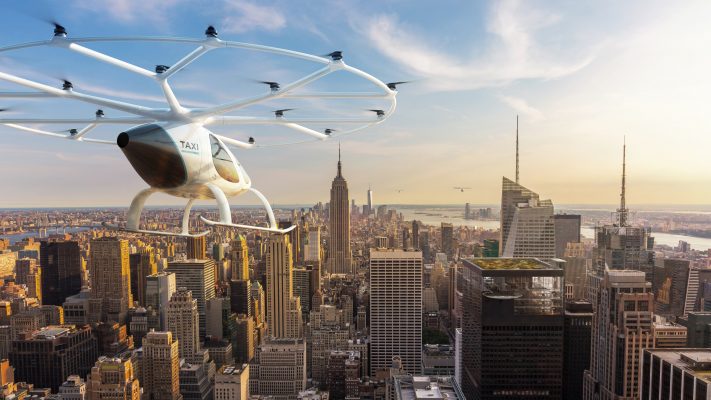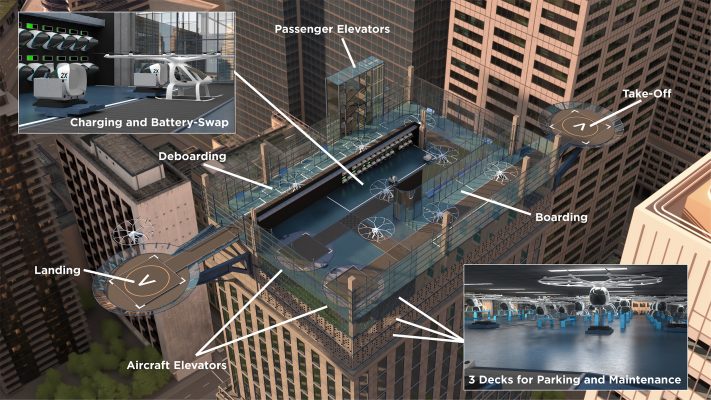Infrastructure to Integrate and Scale Air Taxi Services in Cities
Bruchsal, 17 April 2018 – Today Volocopter, the pioneer in urban air taxi development, presented its air taxi infrastructure for cities. The vision integrates air taxis into existing transportation systems and provides additional mobility for up to 10.000 passengers per day with a single point to point connection. Co-founder Alex Zosel expects the first full Volocopter air taxi systems with dozens of Volo-Hubs and Volo-Ports to be in place within the next 10 years, capable of flying 100.000 passengers an hour to their desired destination.
Volocopters are emission-free, electrically powered aircrafts that take off and land vertically offering a high degree of safety based on full redundancy in all critical systems. They are based on drone technology and scaled up to carry two people, initially for distances of 27 km.1 The German company has shown repeatedly that Volocopters fly safely – last in Dubai and Las Vegas. “Our ambitions do not end with developing the aircraft,” says Florian Reuter, CEO at Volocopter, “we are here to develop the entire ecosystem making air taxi services a reality across the world. This includes the physical and digital infrastructure to manage unmanned systems.”
The presented concept defines the infrastructure necessary to operate and scale an air taxi service into a full network system spanning over mega cities. It consists of Volo-Hubs and Volo-Ports. The Volo-Hubs resemble cable cart stations with Volocopters landing and taking off every 30 seconds for example. Once landed the Volocopter is moved inside the Volo-Hub. Passengers alight the aircraft protected from wind and weather. Battery packs will be swapped automatically in a protected area by robots before moving on to the section, where passengers embark for take-off. Volo-Hubs are the key to substantially increase the capacity of any Volocopter system. Aside from protected deboarding and embarking, they offer sufficient space to park all Volocopters in operation and provide the infrastructure for charging and maintenance.
Volo-Ports expand the Volo-Hub system and offer direct access to a company, shopping mall, hotel or train station for example. They do not require any charging or parking infrastructure and subsequently will be less complex to build. Any Heliports can be used as a Volo-Port with minimal modification.
“We expect any air taxi transport system to begin with a point to point connection and over time grow into a system of dozens of Volo-Hubs in a city.” says Alex Zosel, Co-Founder of Volocopter. “Once operated at scale, flying won’t be significantly more expensive than taking a cab, but it will be significantly faster.”
The company focuses on developing their aircrafts specifically for inner city missions. Volocopter features an extremely stable flight allowing it to maneuver micro turbulences around skyscrapers thus offering a smooth ride for passengers. It has an agreeable sound signature and is so quiet that from 100 m away, it will not be heard over the background noise of a typical city. As it is electrically powered, it is emission free in flight. Both, noise and pollution, are paramount considerations to achieving public acceptance of any new transport system.
About Volocopter
Volocopter is the global leader in the development of electrical vertical take-off and landing multicopters (eVTOL) as autonomous air taxis for the safe transport of people. The technical platform is extremely flexible and permits piloted, remote controlled, and fully autonomous flight. In addition, the unique design offers unprecedented degrees of safety based on the high level of redundancy in all critical components. As early as 2011 the company earned its entry into the history of aviation through the manned flight of the world’s first purely electrical multicopter. Since then the young enterprise has set new milestones: In 2016 Volocopter was granted provisional licensing for a two-seater Volocopter by the German aviation authority and in 2017 the aviation start-up showcased the first ever autonomous flight of an air taxi in cooperation with RTA Dubai. In the meantime, the founders Stephan Wolf and Alexander Zosel have gathered a team of experienced managers like CEO Florian Reuter and CTO Jan-Hendrik. This paved the way for the further expansion of the company. Daimler, Intel and Lukasz Gadowski are among the investors in the company.
1A range that increases as technology advances
























